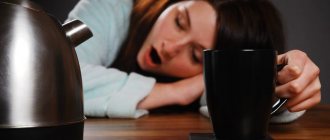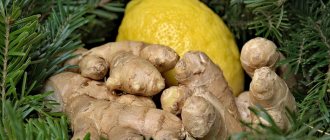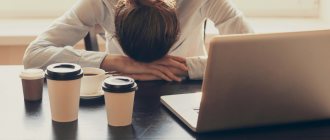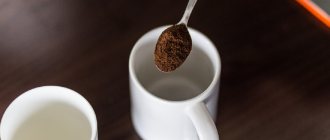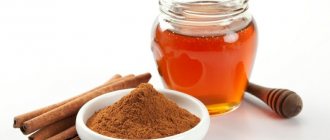Perhaps the most common stereotype about coffee is that you shouldn’t drink it at night before bed. But loyal fans of this drink often ignore such recommendations, because the temperamental drink affects everyone differently. There are even those for whom drinking coffee has a sleeping pill effect. The question of the effect of coffee on normal sleep is worthy of careful consideration, since it is determined by the characteristics of the human body and directly correlates with the state of health. In the article I will tell you how much you can drink before bed and who should not drink it at night.
Is it possible to drink coffee at night and how much?
There have been no large-scale world-class studies on the relationship between sleep quality and coffee consumption. But this topic is very much on the minds of individual research groups that conduct experiments among volunteers.
Most people come to the conclusion that drinking caffeinated drinks before bed is not a good idea, but there are also those who recommend coffee as a stimulant for falling asleep quickly and ensuring sound sleep.
Scientists from Wayne State University in Detroit invited 12 boys and girls who had no sleep problems to take part in the experiment. Every day they received three tablets containing the amount of caffeine equivalent to 3-4 cups of strong coffee, and two placebos, which only the scientists knew about.
The subjects had to take one tablet 6 hours before bedtime, 3 hours before, and immediately before falling asleep. The tablets had different colors, so it was easy to track whether they contained caffeine or not.
After studying the diaries of the participants, in which they noted the quality and duration of their night's sleep, the researchers came to the conclusion that the majority of people who drink coffee less than 6 hours before bedtime experience insomnia.
Most people who drink coffee less than 6 hours before bedtime experience insomnia
Other experts from Detroit also agree with their colleagues: the Center for the Study of Sleep Disorders has conducted related studies.
More than ten thousand people were involved in the experiment. They drank the same number of cups of coffee every day. Some - in the first half of the day, others - in the late afternoon.
By the end of the observations, there was a clear division into two groups: those who drank strong drink after 17:00 experienced problems with sleep, and those who preferred morning coffee did not notice such consequences.
Caffeine and sleep at night are consequences of pleasure
Coffee is loved for its taste, aroma, and warming effect. But the main feature of the drink is caffeine. It is he:
- activates brain activity;
- helps improve performance;
- relieves fatigue;
- gives strength.
Being an effective psychostimulant, caffeine helps prolong hours of wakefulness at night, devote time to work, study, and delay sleep. This effect of the component will be on 90% - 97% of people. The remaining 3%-10% can answer the question of what will happen if you drink coffee at night - nothing. Their bodies simply do not react to caffeine.
You might be wondering: Can coffee make you fat? Should you drink it while losing weight?
Everyone else who decides to allow themselves to drink a cup of strong coffee a few hours before bed should anticipate the consequences - bad mood and loss of energy in the morning, frequent awakenings, restless sleep and even nightmares.

The appearance of insomnia
Insomnia after a cup of strong drink is caused by blocking the hormones adenosine and melatonin. They are responsible in the body for relaxation and good sleep. Caffeine interferes with the production of these neurotransmitters, while stimulating the production of adrenaline.
Canadian scientist Chin Mo Zhou suggested that subjects drink coffee before bed if they had less than 4 hours to drink. After such a short rest and a cup of strong drink, the participants in the experiments were cheerful and almost did not feel tired. At the same time, there were no problems with falling asleep.
Using driving tests, it turned out that concentration was not affected. However, you should not use this method of recharging too often.
How to drink coffee and sleep soundly
So, it is advisable to drink coffee in the first half of the day, since the half-life of caffeine is about 6 hours. This does not mean that you don’t have to limit yourself in the morning: the caffeine norm for an adult without health problems is about 400 mg per day, which is about 3-4 cups of espresso. If you overdose on coffee before noon, you will most likely suffer from insomnia in the evening.
About 8% of people are immune to caffeine or have a reaction in their body. In other words, coffee has a soporific effect on them. However, you should not use it without restrictions, since problems with the cardiovascular system or blood pressure caused by excess adrenaline have not been canceled.
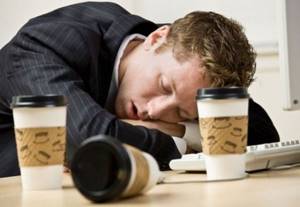
About 8% of people are immune to caffeine or have a reaction in their body
If you still want to drink coffee shortly before bed, you should reduce the concentration of caffeine in it: add milk, lemon, cream, or simply add more water. Not only will cardamom, cinnamon, and ginger add a piquant note to the drink, but they will also weaken the invigorating effect.
It is better to give preference not to strong espresso, but to softer drinks: Americano, latte or cappuccino. Or replace grain coffee with instant coffee. The freeze-dried product contains much less caffeine, which is why it is recommended.
What will help you fall asleep
A cup of your favorite drink is still drunk, and now your body doesn’t want to fall asleep. In this case, it is necessary to neutralize the invigorating effect of coffee.
There are several recipes for how to positively influence the body:
- Drink warm milk with honey and cinnamon, it helps break down caffeine;
- Take a warm shower, give yourself a foot massage and put on warm socks;
- Relax by reading a book or scrolling through the news feed on your phone. The monotonous change of letters and pictures is similar to meditation and helps you fall asleep quickly;
- Get some fresh air. You don’t have to go for a night walk, just open a window or go out onto the balcony, 15 minutes will be enough.
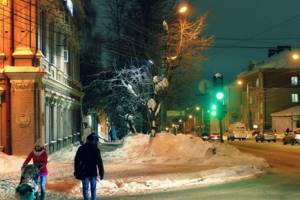
Before going to bed, it is advisable to take a walk or get some fresh air.
How to reduce the harm from drinking coffee at night: effective ways
If you can’t deny yourself the pleasure of drinking a cup of aromatic, invigorating coffee before bed, you can try to neutralize the effect of caffeine on the body. There are several effective ways:
- drink coffee with milk or heavy cream;
- Instead of coffee, enjoy a coffee cocktail with less caffeine;
- add a little lemon;
- reduce the strength of the drink by increasing the volume of water per serving of powder.
You may be interested in Compatibility of coffee and alcohol: all the pros and cons
People of retirement age, as well as mothers during lactation and expectant mothers, children and teenagers, are strictly not recommended to drink coffee at night.

Drinks for a sound sleep
There are many drinks that can help you fall asleep quickly. As a rule, they contain natural ingredients and are not harmful to health. These include herbal infusions such as chamomile, lavender or valerian. You can add milk and honey to taste. The pleasant aroma has a relaxing effect on the nervous system and helps you to fully rest during the night.
Fermented milk products such as fermented baked milk, kefir, and yogurt not only promote sound sleep, but also benefit the intestinal microflora.
A milkshake with banana and almonds will help relieve muscle tension and get in the mood for sleep; it is rich in magnesium and potassium, which normalize cardiac activity.
The boost of energy received from a cup of coffee is short-lived, but problems with sleep after such a drink can last until the morning. For proper rest, it is better to drink a relaxing drink that does not harm your sleep, take a walk and ventilate the room. After 7-8 hours of full sleep, the body will not need emergency recharging.
Coffee for vigor! Or for sleep?
A cup of coffee in the morning for vigor - what could be better for waking up? When you need to work all night and stay up until the morning, coffee comes to the rescue again. But is it really helpful? Many people complain that after coffee they feel sleepy, that’s how special they are. So why does coffee often have the opposite effect than expected?
Coffee bean
In fact, I hasten to disappoint you: if you fall asleep after coffee, you are not special, you are the same as everyone else. The secrets of the popular drink are revealed by an expert in modern health technologies, a fourth generation doctor, great-grandson of academician D.K. Zabolotny (founder of scientific epidemiology and microbiology) - Konstantin Borisovich Zabolotny. He described in detail the mechanism of action of coffee in his works.
It's all about the composition of the coffee bean itself. Coffee beans, like cereal grains, have an outer shell and an inner shell. When it grows, two parts consisting of alkaloids are formed in the grain: the outer part contains caffeine, and the inner part contains theobromine. If you brew coffee from whole, unprocessed grains, both alkaloids are present in the drink.

The effect of caffeine begins immediately and lasts 20-25 minutes. Caffeine constricts blood vessels in the brain, which explains its ability to normalize the condition when blood pressure drops. The tissue vessels of the digestive tract also become narrower, which improves their functioning and accelerates the digestion process. This is why often after drinking coffee there is a desire to eat heavily. At the same time, the vessels passing through the muscle tissues of the body expand after a cup of aromatic drink.
The vessels of the abdominal organs narrow, except for the vessels of the kidneys. Due to improved blood flow in the kidneys, the diuretic effect is explained. After 20-25 minutes, the effect of caffeine wears off, and the effect of theobromine begins to work. Theobromine dilates all blood vessels and constricts the renal ones. Therefore, at the caffeine stage, pressure increases and blood flow improves, and the theobromine stage is accompanied by a decrease in systemic blood pressure, renal blood flow worsens, and sometimes a pulling sensation in the kidney area can be observed.

That is why in good coffee shops they always bring water with a cup of coffee. After drinking a cup of coffee, 20 minutes later it is useful to drink a glass of water to improve kidney function without disrupting water-salt metabolism.
What happens during coffee production?
The external caffeine fraction is used for the production of caffeine-containing medications (citramon, tamipul, etc.) and energy drinks. The inner part of the coffee bean is used in the production of granulated and instant coffee. Therefore, in the USA for about 10 years they have been fighting to have instant and granulated coffee labeled as caffeine-free. Some manufacturers indicate this on the packaging, but virtually any instant coffee contains no more than 5-10% caffeine. Therefore, you don’t get an invigorating effect from it, your blood pressure doesn’t increase much, and you feel drowsy. In this case, it is better to drink it closer to night along with plenty of milk.

We only get the caffeine effect from whole bean coffee, but after it, be prepared for the theobromine phase. It comes after ANY coffee, no matter what brand it is. Depending on the variety, the vigorous phase can last from 20 to 30 minutes, and the theobromine phase will occur in any case and lasts for an hour.
You can track how the theobromine phase progresses if you listen to your feelings after consuming this drink. If you lie down and take a nap during the theobromine phase, you will feel much more alert. And if you drink water 20-30 minutes after a cup of coffee, the theobromine phase will be reduced.
What is the danger of coffee?
It is not always possible to drink whole bean coffee. Unfortunately, even the most expensive brands of instant and granulated coffee will not give you an invigorating effect, but you will still have to deal with the theobromine phase.
Ignorance of the above-described effect of coffee on the human body is most dangerous for those who drink it in order to avoid falling asleep while driving. For example, a truck driver leaves at 4-5 o’clock in the morning, takes a thermos of hot coffee with him, and 20-30 minutes later, after drinking a cup of coffee, he begins to fall asleep - the “thirtieth kilometer” effect occurs. Even if the driver has had enough sleep, such a powerful alkaloid as theobromine will act in any case and drowsiness will occur.

Studies have shown that the largest number of accidents occurs exactly 30 minutes after leaving the starting point or from a cafe where a stop was made for a snack at night. That is why you should absolutely not take instant coffee with you on the road. Strong tea will help best. Both black and green. There is no theobromine in loose leaf tea, only pure caffeine. By drinking strong tea, you can get an invigorating caffeine effect that is not burdened by the subsequent theobromine phase.
Regarding granulated coffee, you should drink it before bed to sleep better. Also, its value lies in the fact that it is harmless for hypertensive patients. When instant coffee began to be produced, the number of hypertensive crises in the world decreased.
Caffeine affects not only the circulatory system, but also the nervous system. During the caffeine phase, we feel excited, energized, and even our mood improves. Coffee makes us experience a kind of “swing”: first a sharp rise in the activity of the whole organism, and then a sharp decline. As you know, our body does not perceive any sudden changes with much enthusiasm.
This is also related to the amount of coffee you can drink during the day. Most scientists limit the amount to 1-2 cups per day. If this norm is exceeded, the risk of cardiovascular diseases increases. Regarding pregnant women, scientists have not yet come to a clear decision whether they can take coffee at all. There is evidence that consuming more than 3 cups per day increases the risk of miscarriage.
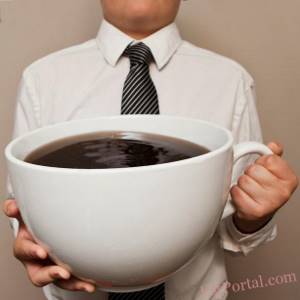
Coffee and addiction
The number of people who cannot live without coffee is more than you can imagine. Many people notice that they actually experience addiction and even dependence. Some say that without coffee they feel depressed, others say that they want to experience the taste and aroma.
The alkaloid caffeine is truly addictive. Many people get hooked on the invigorating effect, and it is also a wonderful psychological ritual, similar to smoking a cigarette. In principle, many smokers consider drinking coffee with a cigarette the height of bliss. Our attachment to psychological rituals is sometimes stronger than to chemical elements. Such rituals give a feeling of calm and stability. In addition, pay attention to the fact that the body may lack elements such as sulfur, phosphorus or sodium if you suddenly want coffee.

Coffee is an integral part of many people's mornings. Understanding the mechanisms of its action on the body helps us understand why we want to sleep so much after coffee. You will probably not give up this aromatic drink completely, but at least you will know that on the road or in the morning strong tea will be more effective, and a cup of coffee should be washed down with a glass of water.
Anna BUNYAK
Download Premium WordPress Themes Free
Download Premium WordPress Themes Free
Premium WordPress Themes Download
Download Best WordPress Themes Free Download
free download udemy course
CaffeineFood
